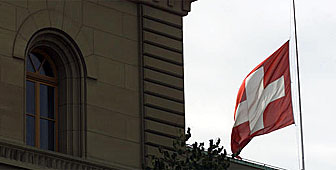
World wakes to new conflict

Two days after the terrible events in the United States, people across the world are coming to terms with a form of conflict so shocking; many had never imagined it.
In Switzerland, as across Europe, citizens acknowledged the tragedy – church bells rang in unison at 1pm, and in the capital, Bern, trams and buses stopped for a minute’s silence in respect for the victims. Flags flew at half-mast.
As the reality of Tuesday’s events in New York and Washington sinks in, people are coming to realise that old assumptions about what constitutes a conflict have changed. Kurt Spillmann, professor of security studies and conflict research at Zurich’s federal institute of technology, says the world must get used to a new threat.
“The world has indeed changed,” Spillmann told swissinfo, “we knew that our modern societies were vulnerable, but we never had an example as drastic as this one, and I think what we see now is that modern violent conflicts do not take place anymore between armies and nations.”
A world out of balance
Spillmann points to the extreme contrast between the apparently small number of people involved in the attacks, and the appalling scale of the destruction they caused.
“These are small groups filled with hatred, they are prepared to sacrifice themselves,” said Spillmann, “and whole civilisations, in this case hundreds of millions of Americans, with a mighty military machine, are powerless in the face of these terrorists.”
Spillmann believes long-held assumptions about conflicts between nations have to be replaced now by a careful assessment of the new threats to our security.
“In fact if something like this had happened 15 years ago many people would have thought this is it, the start of a major conflict,” he said, “but now that’s just not the case.”
“What is becoming more and more clear,” Spillmann continued, “is that our planet is just too small for nations to be fortresses unto themselves, we have to build our security jointly; we have security all together or not at all.”
Explore psyche of terrorists
Spillmann believes an important step towards creating common security is an exploration of what inspires acts of terrorism in the first place.
“We have never really explored the psychology of terrorists, of fundamentalists,” said Spillmann, “they are like the kamikaze pilots of World War II; they are prepared to sacrifice themselves, voluntarily. We need to ask what lies behind such profound hatred. As yet we don’t know.”
Spillmann added that it would be a long process to build measures that would prevent terrorism, “we need to change the conditions right at the bottom, we need to make social changes, in order to ensure that terrorism does not thrive,” he said.
Weakness of open society
The attractive aspects of an open society, offering freedom of movement and freedom of speech, are the very things that make us vulnerable to terrorism.
Spillmann says countries need to balance citizens’ rights and the need for stricter safety measures.
“Terrorists take advantage of the weakness of an open society,” said Spillmann, “so we will see an increase in controlling citizens of open societies.
But, despite the terrible tragedies in the United States, Spillmann does not believe that people’s lives will change fundamentally.
“Of course we will see greater precautions at airports and at borders,” he said, “but I don’t think we will see a profound change in daily life. The fact is, we want to keep our open society, and rightly so.”
“We don’t want to re-enter the age of fortified national states, each suspicious of its neighbours.”
by Imogen Foulkes

In compliance with the JTI standards
More: SWI swissinfo.ch certified by the Journalism Trust Initiative

























You can find an overview of ongoing debates with our journalists here . Please join us!
If you want to start a conversation about a topic raised in this article or want to report factual errors, email us at english@swissinfo.ch.